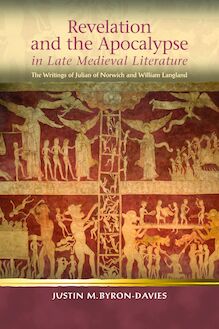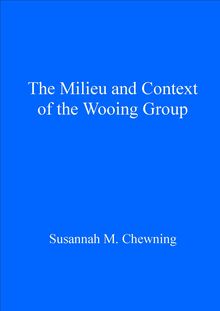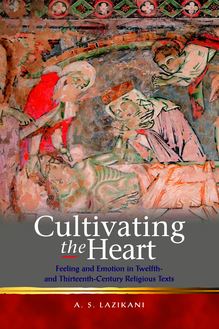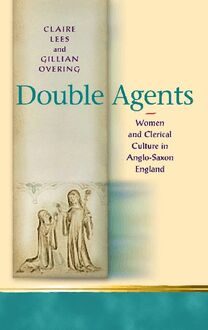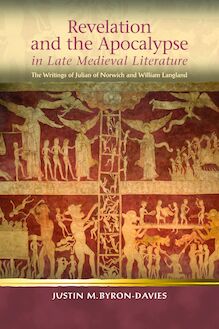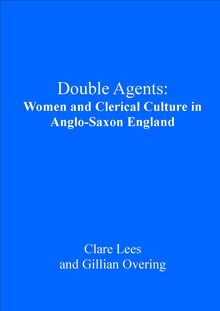Soul-Health , livre ebook
212
pages
English
Ebooks
2018
Obtenez un accès à la bibliothèque pour le consulter en ligne En savoir plus
Découvre YouScribe et accède à tout notre catalogue !
Découvre YouScribe et accède à tout notre catalogue !
212
pages
English
Ebooks
2018
Obtenez un accès à la bibliothèque pour le consulter en ligne En savoir plus
Publié par
Date de parution
15 octobre 2018
Nombre de lectures
3
EAN13
9781786833327
Langue
English
Poids de l'ouvrage
7 Mo
Soul-Health explores the connection between reading and healing. The act of reading engages deeply with our emotions and psychology, and this book broadens our understanding of that process by the surprising revelation that feeling bad has been understood as the best thing for mental and spiritual health. The mental and emotional impact of reading expanded in the Middle Ages into a therapeutic tool for improving the health of the soul – a state called salus animae – and focusing on later Medieval England, the present study explores a core set of religious texts that identify themselves as treatments for the soul. These same texts, however, evoke powerfully negative emotions. Soul-Health investigates each of these emotions, offering an analysis of how fear, penance, compassion and longing could work to promote the health of the soul, demonstrating how interest in mental and spiritual health far pre-dates the modern period, and is more complex and balanced than simply trying to achieve joy.
Series Editors’ Preface
Acknowledgements
Abbreviations
Note on Editions and Translations
Introduction: Cura Animarum
Apprehensive Medicine
Lyrical Treatment
Compassionate Healing
Longing for Health
Dangerous Reading
Conclusion: Sowle-hele
Notes
Select
Bibliography
Index
Publié par
Date de parution
15 octobre 2018
EAN13
9781786833327
Langue
English
Poids de l'ouvrage
7 Mo
SOUL-HEALTH
THERAPEUTIC READING DANIEL McCANN
IN LATER MEDIEVAL ENGLAND
‘The health of the soul preoccupied medieval Christians
and their use of medical terms, for it was no metaphor.
Daniel McCann shows how pious reading could be
therapeutic for the soul, because of the deep emotions
it evoked. His book is a major contribution to both Soul-Health
medical humanities and medieval literary studies.’
Professor Peregrine Horden, Professor of Therapeutic Reading
Medieval History, University of London
in Later Medieval England
‘This important volume, which explores the concept of
therapeutic reading in late medieval English religious culture,
demonstrates a deep knowledge of medieval theories about
affect, combined with acute sensitivity to the specific ways in
which religious writings produce feeling in their recipients.’g reli on i Denis Renevey, Professor of Medieval English
Language and Literature, University of Lausanne &cu ture l in
themiddle Soul-Health explores the connection between reading and
healing. The act of reading engages deeply with our emotions ages
and psychology, and this book broadens our understanding
Series editors: of that process by the surprising revelation that feeling bad
Denis Renevey has been understood as the best thing for mental and spiritual
health. The mental and emotional impact of reading expanded Diane Watt
in the Middle Ages into a therapeutic tool for improving the
health of the soul – a state called salus animae – and focusing
on later Medieval England, the present study explores a core
set of religious texts that identify themselves as treatments for
the soul. These same texts, however, evoke powerfully negative
emotions. Soul-Health investigates each of these emotions,
For a complete list offering an analysis of how fear, penance, compassion and
of series titles see longing could work to promote the health of the soul,
www.uwp.co.uk demonstrating how interest in mental and spiritual health
far pre-dates the modern period, and is more complex and
balanced than simply trying to achieve joy.
Daniel McCann is the Simon and June Li Darby
Fellow in English Literature at Lincoln College, Oxford.
Cover image: Georges de La Tour, Magdalene
with the Smoking Flame (c.1640), Musée du Louvre. D A N I E L M c C A N N
By permission, Pictures Now / Alamy Stock Photo.
Cover design: Olwen Fowler
soul-health.indd 1 10/10/2018 11:58RELIGION AND CULTURE IN THE MIDDLE AGES
Soul-Health
00 Prelims Soul-Health 2018_10_4.indd 1 04-Oct-18 1:24:19 PMSeries Editors
Denis Renevey (Université de Lausanne)
Diane Watt (University of Surrey)
Editorial Board
Miri Rubin (Queen Mary University of London)
Jean- Claude Schmitt (École des Hautes Études en Sciences Sociales, Paris)
Fiona Somerset (Duke University)
Christiania Whitehead (University of Warwick)
00 Prelims Soul-Health 2018_10_4.indd 2 04-Oct-18 1:24:19 PMRELIGION AND CULTURE IN THE MIDDLE AGES
Soul-Health
THERAPEUTIC READING IN
LATER MEDIEv AL ENGLAND
DANIEL McCANN
UNIvERSITY OF WALES PRESS
2018
00 Prelims Soul-Health 2018_10_4.indd 3 04-Oct-18 1:24:19 PM© Daniel McCann, 2018
All rights reserved. No part of this book may be reproduced in any material form
(including photocopying or storing it in any medium by electronic means and whether
or not transiently or incidentally to some other use of this publication) without the
written permission of the copyright owner except in accordance with the provisions of
the Copyright, Designs and Patents Act. Applications for the copyright owner’s written
permission to reproduce any part of this publication should be addressed to University
of Wales Press, University Registry, King Edward VII Avenue, Cardif CF10 3NS.
www.uwp.co.uk
British Library Cataloguing-in-Publication Data
A catalogue record for this book is available from the British Library.
ISBN 978-1-78683-331-0
e- ISBN 978-1-78683-332-7
The right of Daniel McCann to be identifed as author of this work has been asserted in
accordance with sections 77 and 79 of the Copyright, Designs and Patents Act 1988.
Typeset by Eira Fenn Gaunt, Pentyrch, Cardif
Printed by CPI Antony Rowe, Melksham, Wiltshire
00 Prelims Soul-Health 2018_10_4.indd 4 04-Oct-18 1:24:19 PMContents
Series Editors’ Preface vii
Acknowledgements ix
Abbreviationsxi
Note on Editions and Translations xiii
Introduction: Cura Animarum1
1 Apprehensive Medicine 27
2 Lyrical Treatment 51
3 Compassionate Healing 81
4 Longing for Health 111
5 Dangerous Reading 133
Conclusion: Sowle-hele 153
Notes 159
Select Bibliography 179
Index189
00 Prelims Soul-Health 2018_10_4.indd 5 04-Oct-18 1:24:19 PM
This page is intentionally left blank
00 Prelims Soul-Health 2018_10_4.indd 13 04-Oct-18 1:24:20 PM
Series Editors’ Preface
Religion and Culture in the Middle Ages aims to explore the interface between medieval
religion and culture, with as broad an understanding of those terms as possible. It puts to
the forefront studies which engage with works that signifcantly contributed to the
shaping of medieval culture. However, it also gives attention to studies dealing with
works that refect and highlight aspects of medieval culture that have been neglected in
the past by scholars of the medieval disciplines. For example, devotional works and the
practice they infer illuminate our understanding of the medieval subject and its culture
in remarkable ways, while studies of the material space designed and inhabited by
medieval subjects yield new evidence on the period and the people who shaped it and
lived in it. In the larger feld of religion and culture, we also want to explore further the
roles played by women as authors, readers and owners of books, thereby defning them
more precisely as actors in the cultural feld. The series as a whole investigates the
European Middle Ages, from c.500 to c.1500. Our aim is to explore medieval religion
and culture with the tools belonging to such disciplines as, among others, art history,
philosophy, theology, history, musicology, the history of medicine, and literature. In
particular, we would like to promote interdisciplinary studies, as we believe strongly
that our modern understanding of the term applies fascinatingly well to a cultural period
marked by a less tight confnement and categorization of its disciplines than the modern
period. However, our only criterion is academic excellence, with the belief that the use
of a large diversity of critical tools and theoretical approaches enables a deeper
understanding of medieval culture. We want the series to refect this diversity, as we
believe that, as a collection of outstanding contributions, it ofers a more subtle
representation of a period that is marked by paradoxes and contradictions and which
necessarily refects diversity and diference, however difcult it may sometimes have
proved for medieval culture to accept these notions.
00 Prelims Soul-Health 2018_10_4.indd 7 04-Oct-18 1:24:20 PM
This page is intentionally left blank
00 Prelims Soul-Health 2018_10_4.indd 13 04-Oct-18 1:24:20 PM
Acknowledgements
This book is the result of my postdoctoral research fellowship, generously funded by the
Leverhulme Trust. I thank them for their crucial assistance; without it this book and my
chance of an academic career would not have been possible. Since 2012, the University of
Oxford has been a home for me, and this book has benefted enormously from that
institution and the vast resources and expertise it holds. In that respect it is a book born out
of many interactions and conversations, and so I owe thanks to my colleagues and friends
here. Such support came to me in the form of Freya Johnston at St Anne’s College,
Edward Wilson from Worcester College, and Timothy Michael from Lincoln College:
thank you all for your patient support and advice. I owe particular thanks to a number of
the medievalists I met here: Mishtooni Bose, Kantik Ghosh, Laura Ashe, Marion Turner,
Annie Sutherland, Philip Knox, Anya Adair, Kylie Murray, John C. Hirsh and Andy
Orchard. Each has provided me with stimulating discussion, raucous wit and unique
professional examples. Time is a more precious resource than anything else and my
colleagues here have been extremely generous with theirs. For that I am truly grateful.
I owe especial thanks to a number of other medievalists. Mary Carruthers and Peregrine
Horden have been two constant sources of support and encouragement, and I am very
grateful for the time and attention each has given me since I came to Oxford and before that
time. Also, Giuseppe Pezzini deserves a special commendation for spending his time (and
patience) in teaching me Latin. Denis Renevey also deserves particular thanks, and he has
been extremely generous with his time, expertise and advice. John Thompson and Malcolm
Andrew also deserve thanks as my early mentors, as they encouraged me to develop into a
medievalist, and made the majority of time at Queen’s University Belfast stimulating and
enjoyable. Sr Maggie Ross has been a constant source of spiritual and intellectual advice,
and I always enjoy our cofees together. The greatest debt of gratitude, however, is to Vincent
Gillespie. I frst met him in the form of my external examiner, and after a robust viva he
has become both my mentor and my friend. His depth of knowledge is matched only by his
generosity and scholarly humility, and he has always ofered me his time, attention and
advice. This book is, in many ways, the result of our conversations and the comments he
made on early drafts. I am, and will always be, extremely grateful to him and the example
he has given me.
Finally, I owe my dear wife Kathrin and my darling daughter Eloise a great deal of thanks.
They have proved infnitely patient and kind with the grumpy man writing makes of me.
Kathrin has been a constant source of support, encouragement, wisdom and love; an
